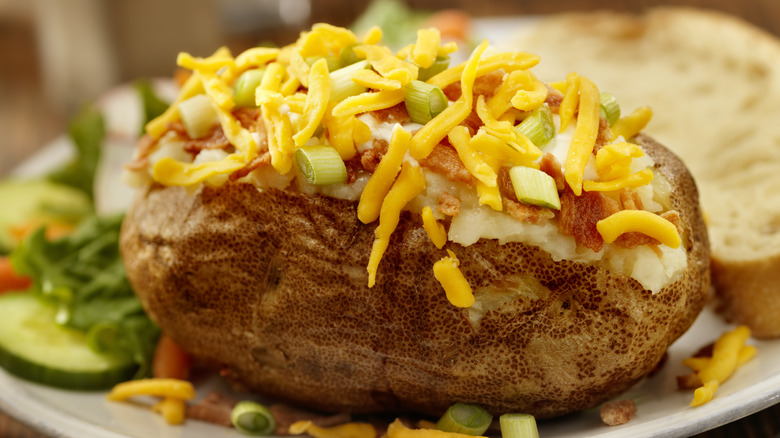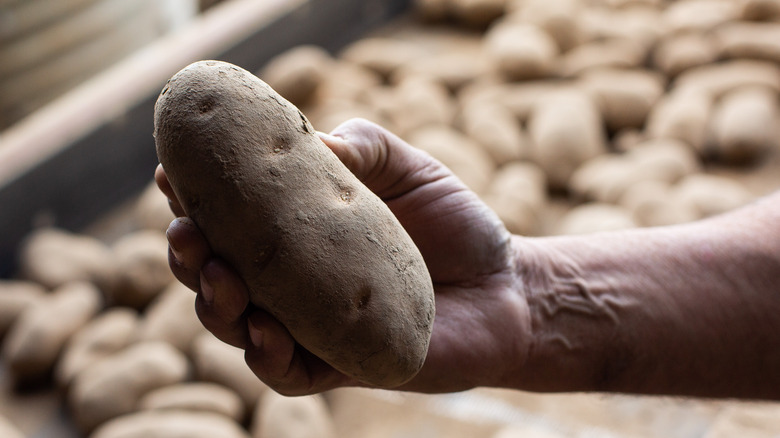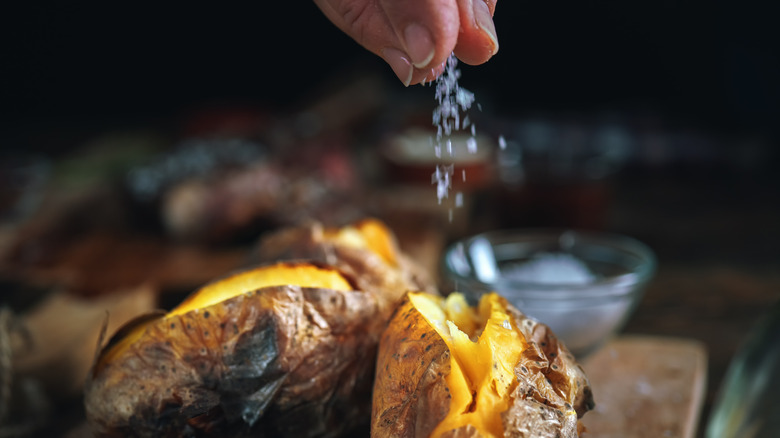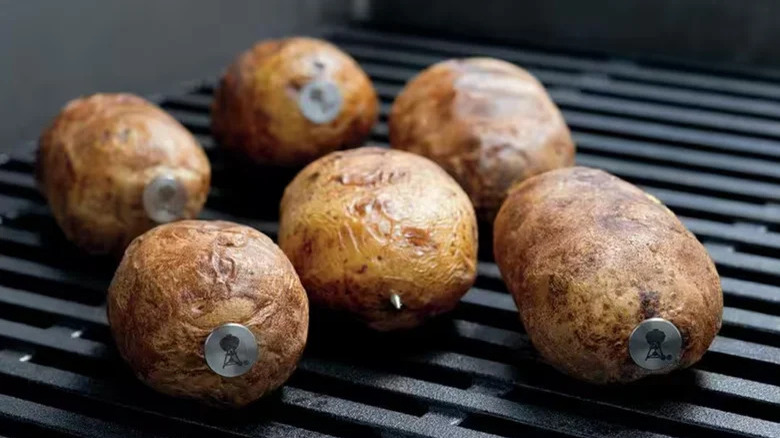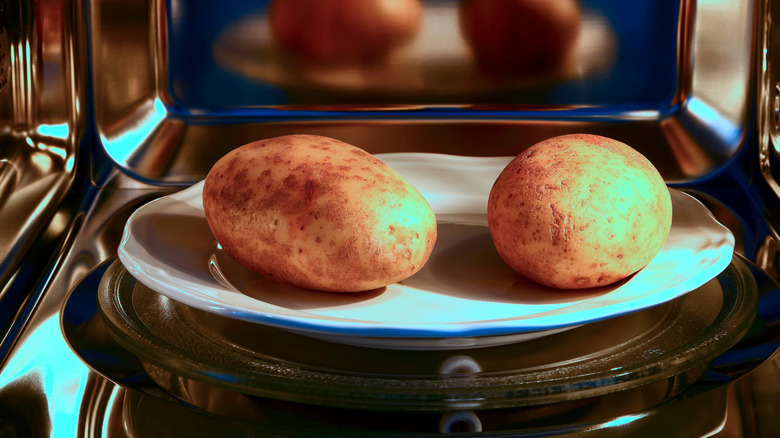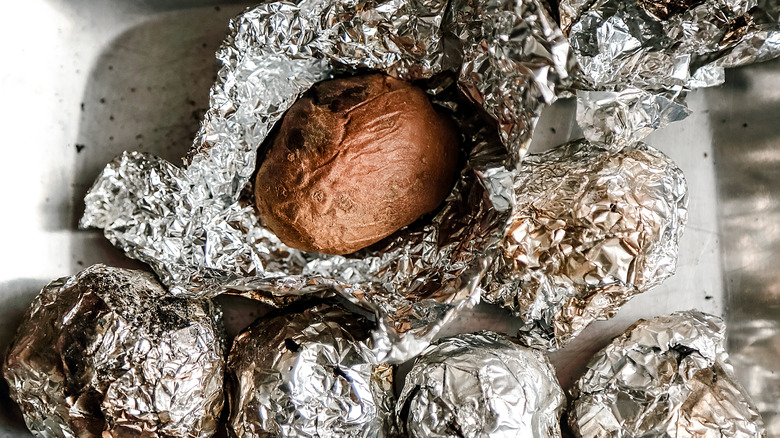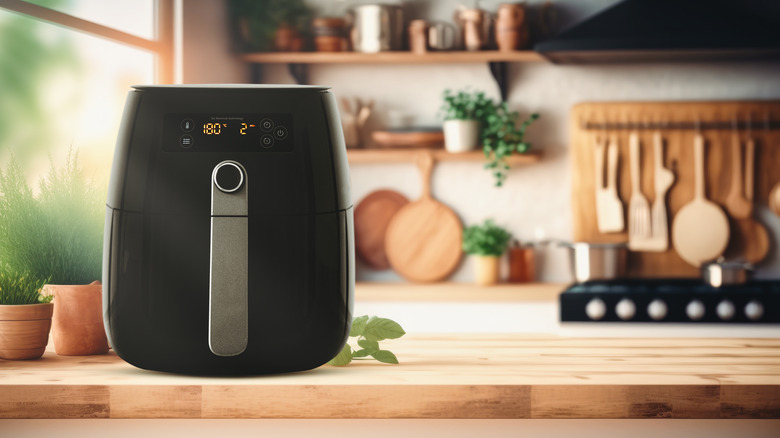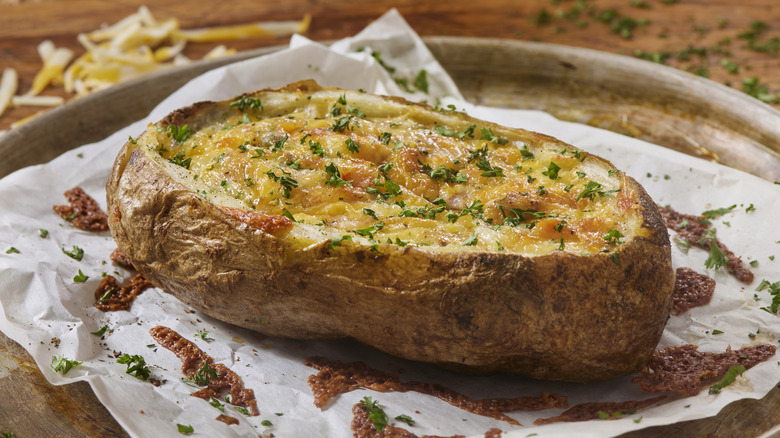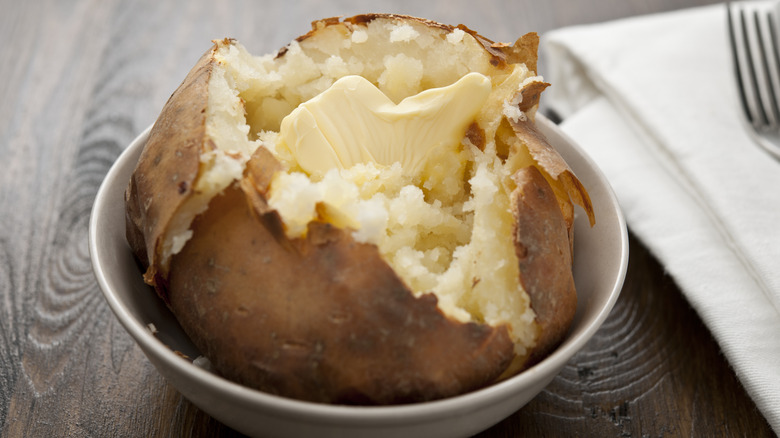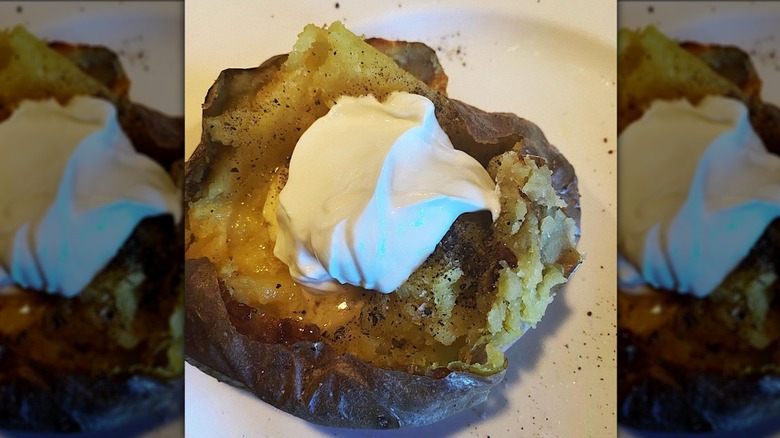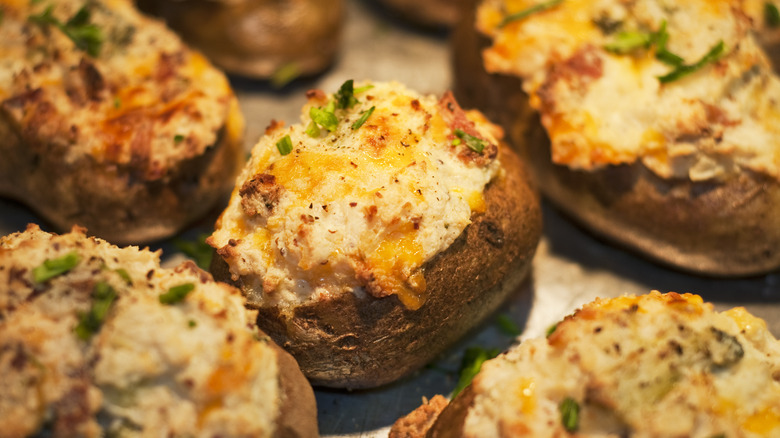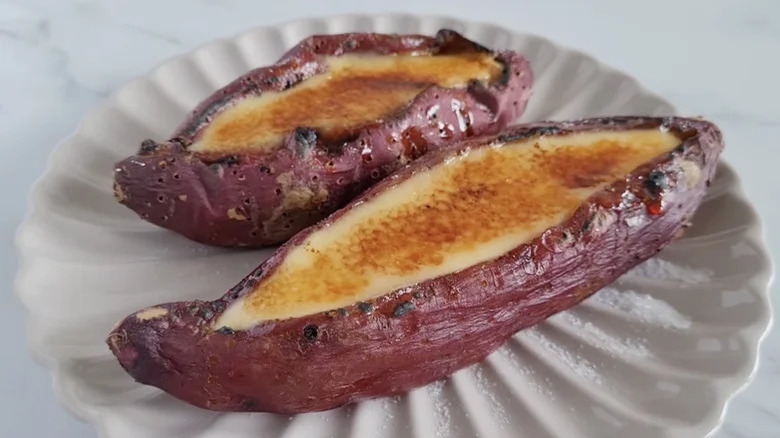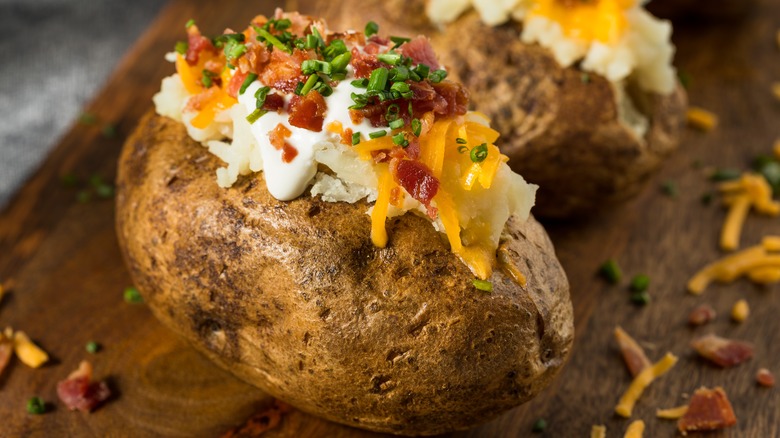14 Mistakes Everyone Makes With Baked Potatoes
Often relegated to a side dish (albeit one with a cult following), the humble potato can actually be the star of your plate, especially when it comes loaded with toppings. A loaded baked potato is the ultimate comfort food, and the cheesier, the better.
Not all baked potatoes are created equal, however, and if you've ever had the misfortune of a sad, soggy baked potato you know what we're talking about. From tossing them in the microwave and underdoing the additions to being a little too tender with the tubers and ruining them in the reheating, we're all guilty of taking shortcuts that have done baked potatoes a major disservice.
Sub-par spuds aren't a vibe. Right those past wrongs and elevate your baked potato game, permanently. Here are some of the worst mistakes everyone makes with baked potatoes, and how to avoid them for beautiful baked potatoes every single time.
1. Being too loyal to Russets
Russet potatoes are queen when it comes to baked potatoes, the thick skin and low-moisture, high-starch content making for the moreish mélange of crispy-on-the-outside, fluffy-on-the-inside. In fact, some would argue choosing a lesser potato variety is the biggest reason your baked potatoes are mushy so it makes sense that people tend to want to stick with Russets. We're in favor — if it isn't broke, don't fix it. Then again, dare to stray from tradition and you'll be handsomely rewarded with a whole new world of taste sensation.
If you've never dabbled in baked sweet potatoes before, they're worth adding to your culinary repertoire. But for the best baked sweet potatoes, skip the oven — it's all about the slow cooker. Yes, this takes about eight hours of foresight which, truth be told, we don't always come into meal prep with, but once you get a taste, you'll be hooked because slow-cooking sweet potatoes unlocks their natural sugars delivering a sweet hit that'll keep you coming back for more.
2. Basting your potatoes at the beginning of the bake
Crispy skins make for the holy grail of baked potatoes but they shouldn't be to the detriment of a fluffy interior so if you've been putting your spuds in the oven pre-oiled, you've been basting baked potatoes at the wrong time. While vintage cookbooks will suggest oiling and seasoning your potatoes prior to baking, you'll actually get crispier baked potatoes (and a better inner texture) if you put them in the oven as is, reserving the oil and salt for 10 minutes before the end of their baking time.
How does this delay make a difference? Oil acts as a moisture lock, preventing water within the potatoes from evaporating which means that while you might end up with a crispy-skinned potato, you can kiss goodbye to a dreamy fluffy interior. Slapping on the oil towards the end of the baking instead allows you to have both that sought-after interior and an extra crispy outside, and you should accept nothing less.
3. Not using potato nails
Look, we're not suggesting you perform an intricate voodoo ceremony on your potato to enact revenge on an ex, but skewering your potatoes with a nail is a proven hack for top-tier baked potatoes, faster. Seven to 11 minutes faster, to be exact — and hey, in this time-strapped world, every minute counts. Just don't go using any old nail (unless you want your baked potatoes with a side of tetanus). Pick up a set of kitchen-safe potato nails from your local Home Depot or use a regular metal cooking skewer.
Want to know how nails can help bake potatoes faster and with fluffier results? Push a nail into your potato, end to end. Aluminum is a great heat conductor so sticking a potato with an aluminum nail will heat the potato's interior more quickly than usual, turning the hard, raw potato insides into a fluffy delight. Nailed it.
4. Zapping your potato in the microwave
Some shortcuts are swoon-worthy but throwing your potato in the microwave will only end in heartbreak. Microwaves can pull off magical feats but there'd be public outcry if people started attempting to make pulled pork in them (and rightly so), and you shouldn't be attempting a baked potato in them either. Why? Microwaving potatoes can actually be dangerous — 2,000 people had to be evacuated from a ballet in Britain when a forgotten baked potato exploded in a microwave triggering a fire alarm in 2001, per the BBC.
Drama aside, low and slow-style cooking is transformational — sometimes there's truth to the adage "good things take time." And while we're all for making life easier, a really good baked potato is definitely worth the wait. Cooking your potatoes in the oven for three hours is a game-changing tip for extraordinary baked potatoes.
While we're adamant your potato deserves better than a microwave, if a microwave's all you've got to work with then you best do everything you can to give that potato as royal a treatment as possible. Our top tip? Use paper towels for perfect microwaved baked potatoes. There's a bit of minor prep work involved like stabbing some holes in the potato, wetting the paper towels, and finishing with a final naked nuke by swapping out the towels for a slick of oil, but it's certainly worth it to avoid an unsatisfying, dried out spud.
5. Wrapping your potatoes in aluminum foil
Unless you plan on sending your baked potato into space, it doesn't need its own spaceship. In fact, you should never bake a potato in aluminum foil. If you do, it's technically not a baked potato anymore, it's a steamed one.
When a potato is heated, the water inside it evaporates and the cells expand which causes the potato texture to soften and become fluffy, provided the water has somewhere to evaporate. A potato cooked in foil will inevitably turn out soggy — the foil acts as a casing, locking moisture inside the potato, and preventing it from evaporating. The Idaho Potato Commission advocates for leaving the aluminum foil in the drawer and, instead, baking potatoes in the oven, free from foil, at 425 F for about an hour. The Commission emphasizes that wrapping your potatoes in foil isn't a worthy fast-track, and in fact can increase cooking time.
6. Overcooking your potatoes in the air fryer
You might have access to an oven but if you don't have hours to wait for your potato to bake, it's not very helpful now, is it? If you find yourself in this highly relatable predicament, we've got two words for you: air fryer. The unicorn of kitchen appliances — rivaled only, perhaps, by Vitamix — the humble air fryer can do just about anything, including perfectly baked potatoes, which can be plate-ready in less than 60 minutes.
Not even air fryers are fail-safe, however, with potential peril lurking in the form of accidental overcooking so if you're considering giving it a go, know how long it takes to cook a baked potato in the air fryer. With your air fryer set at 400 F, the first bake should take 30 minutes after which you'll begin a series of 5-minute interval bakes until they're soft enough you can slide a knife in.
7. Only baking your potatoes once
What's better than a baked potato? A twice-baked potato, of course. If you're only baking your potatoes once, you're missing out on half the taste, and that's just not okay.
We love this ultimate twice-baked potato recipe. The first bake ensures the potato is cooked through. You then scoop out the insides, combine them with your choice of fillings, and pile the glorious blend into the potato skins (aka 'potato boats'), being sure to top with cheese. The second bake brings everything up to the same temperature and, most importantly, melts the cheese into a gooey topping. Sweet potatoes are just as tasty twice-baked too, especially when topped with chopped pecans, chives, and a slash of extra butter.
Don't get us wrong, though — twice-baked isn't the same as over-baked. The Idaho Potato Commission suggests a baked potato is done once its internal temperature reaches 210 F. You can use a kitchen thermometer to monitor your potato's interior and whip it out of the oven when it's just right.
8. Not allowing your potatoes to rest
We love a piping hot baked potato but there's a difference between piping hot and all-out inferno, the latter which is likely to render your sense of taste M.I.A., robbing you of the pleasure of enjoying your freshly-baked potato, and anything else for that matter. There's more to it than that though, not allowing your potatoes to rest can have implications for your gut health.
Potatoes are carbohydrate-rich root vegetables that contain something called "resistant starch", long chains of glucose which can't be broken down by the body. Instead, resistant starch is used as fuel for bacteria in your large intestine and is great for gut and overall health. Intriguingly, one study showed that cooling potatoes overnight after cooking tripled their resistant starch content, boosting the associated health benefits.
While, understandably, you might not be especially excited about an intentionally cold baked potato, leaving your baked spud to go cold once in a while could be good for you. Lean into it by loading it up with potato salad toppings like blitzed celery, egg, mayonnaise, mustard, and garlic — a classic, and beloved, cold potato combination. Consider it an excuse to eat baked potatoes in the summertime (not that you ever needed an excuse).
9. Being too gentle with your potatoes
Baked potatoes might be a culinary treasure that should be held in the same high regard as a Fabergé egg but treating them like one is a big mistake. On the contrary, a little rough-and-tumble with your tuber pays off, according to an Instagram post by Martha Stewart.
The legendary chef posted a photo of her lunch on Instagram in 2020 — a casual baked potato with an enviably crispy jacket, a slather of butter, cracked black pepper, and a dollop of sour cream. The caption held a tip that would change the baked potato game forever: Slam your freshly baked potato down on the kitchen bench, and do it with gusto. The impact creates the iconic, fluffy texture that makes baked potatoes absolute showstoppers.
This should come as no surprise — we love a pummeled potato, and we're not talking about mashed. No, smashed potatoes had a moment on TikTok in 2022, but, according to The New York Times, they first came into vogue some 20 years earlier. In short, put a bit of oomph into your baked potato prep and you'll nudge it towards its full potential. Drop it like it's hot.
10. Skimping on the toppings
There's nothing wrong with a baked potato topped simply with a generous slap of sour cream and a sprinkling of chives — one mouthful of that creamy goodness can turn a tough day into a great one. But then there's kumpir, the baked potato snack that Turkey adopted. A giant, crispy spud packed to the hilt with all manner of toppings like shredded cheese, butter, sliced sujuk Turkish sausage, vegetables and spicy sauce, it's the baked potato equivalent of everything and the kitchen sink, in the best way. There's a time and a place for culinary minimalism but it isn't anywhere near your baked potato, and taste is only one of the reasons why.
Loading your baked potato up with reckless abandon can actually be somewhat healthier than a plain baked potato. Potatoes are a good source of vitamins and minerals including vitamin C and potassium, and may help lower blood pressure, according to Healthline. However, potatoes are a high glycemic index (GI) food — especially when they're baked — which means they cause a person's blood sugar to spike, making baked potatoes a bit of a hazard for people with diabetes and others trying to regulate their blood sugar levels. One way of reducing the glycemic index of a food is to combine it with protein and fats which slow the digestion of carbs and subsequent rise in blood sugar so stuffing your potato with cheese and butter (within reason) may help to regulate your blood sugar and energy levels.
11. Choosing scallions over chives
Sour cream, a true tenet of baked potato toppings, pairs sensationally with a sprinkle of green but the grass-like blades of chives and scallions, also known as green onions, aren't as equally suited to baked potatoes as you might think. In fact, there are two main things scallions and chives have in common and that's their green hue, and how sprinkling them on the top of just about anything makes us feel healthy. Beyond that, each herb has a unique flavor profile and you should definitely choose chives over scallions for a better baked potato.
Chives have a less pungent flavor and meld into whatever they're perched upon, politely complementing existing flavors. You can taste them but not to the point where they break the culinary fusion you worked so hard on when you chose your toppings. Scallions, on the other hand, are closer to the punch-you-in-the-face-with-onion type end of the spectrum. Don't get us wrong, we love scallions, but rather than quietly blending, they bring an additional layer of flavor that can prove to be a bit out of place in a baked potato, and would be more suited to Chinese scallion pancakes, in Korean bulgogi, or in a taco salsa.
Chives and creaminess make for a delightful match. That said, if you're craving a baked potato that's a little more exotic, topping your tuber with chopped scallions could be exactly what you're after.
12. Condemning baked potatoes to be strictly savory
Typically stuffed with meat or vegetables, baked potatoes are a drool-worthy savory staple. Then again, there's the bliss point, that heavenly ratio of salt, sweet, and creaminess that makes creations like Cherry Vanilla D. Pepper near impossible to refuse. There's no reason why bliss points can't be summoned into your spud. In fact, it's a mistake not to.
A little sugar, spice, and all things nice can transform a baked potato. Think: Sour cream and honey-spiked apple compote, maple pecans, and a dash of butter or a dusting of brown sugar which will enhance a sweet potato's natural sugars, or a classic pairing of brie and cranberry with a sprig of rosemary.
Feeling a little daring? Try your hand at recreating a twist on yaki-imo, a street food from the Gifu prefecture in Tokyo where burnt sugar and custard (aka crême brûlée) is baked into satsumaimo, a Japanese sweet potato identifiable by its purple skin. Here's how to bake crème brûlée directly in a Japanese sweet potato for a dessert fit for billionaires.
13. Not eating the potato skin
While we're strong proponents of loading baked potatoes with all manner of fillings, over-zealous fillings could mean you actually don't get to have your baked potato and eat the skin too, which is a faux pas you don't want to be making because potato skins are packed full of goodness. According to Livestrong, potato skin contains a whole lot of vitamins and minerals that are good for health, like B vitamins which can help to reduce stress, and magnesium which can strengthen bones and teeth. Eating potato skins may even boost your immunity thanks to the phytonutrient quercetin.
Intriguingly, if you eat potato skin separately rather than with the rest of the baked potato, you're set to absorb more fiber. So, if you do find yourself full a little too prematurely to have space for that potato skin, don't throw it out. Pop them into the fridge instead and reap the nutritional benefits in a future meal.
14. Drying out a leftover baked potato
A baked potato done well is likely to be snaffled up before it has a chance to become leftovers but on the rare occasion you do encounter a leftover baked potato, accidentally drying it out is practically sacrilege. Firstly, avoid the microwave. Unless accompanied by a damp paper towel it shouldn't be anywhere near your leftover baked potato (or any potato, period).
The absolute best ways to reheat baked potatoes involve either an oven or a toaster oven (the process is the same), an air fryer, or the stovetop. In all cases, start with your potato at room temperature. An oven or toaster oven will reheat your potato in about 15-20 minutes, while an air fryer will do it in 3 to 4 minutes. The stovetop is a two-part process beginning by placing the potatoes in a pan to steam them, then cranking the heat up and shaking the pan — like you would with kettle corn — to help distribute the heat. Once your potato's nice and hot, all that's left to do is dig in, smug in the fact that not only did you pull off the most perfect baked potato, you did so twice.
